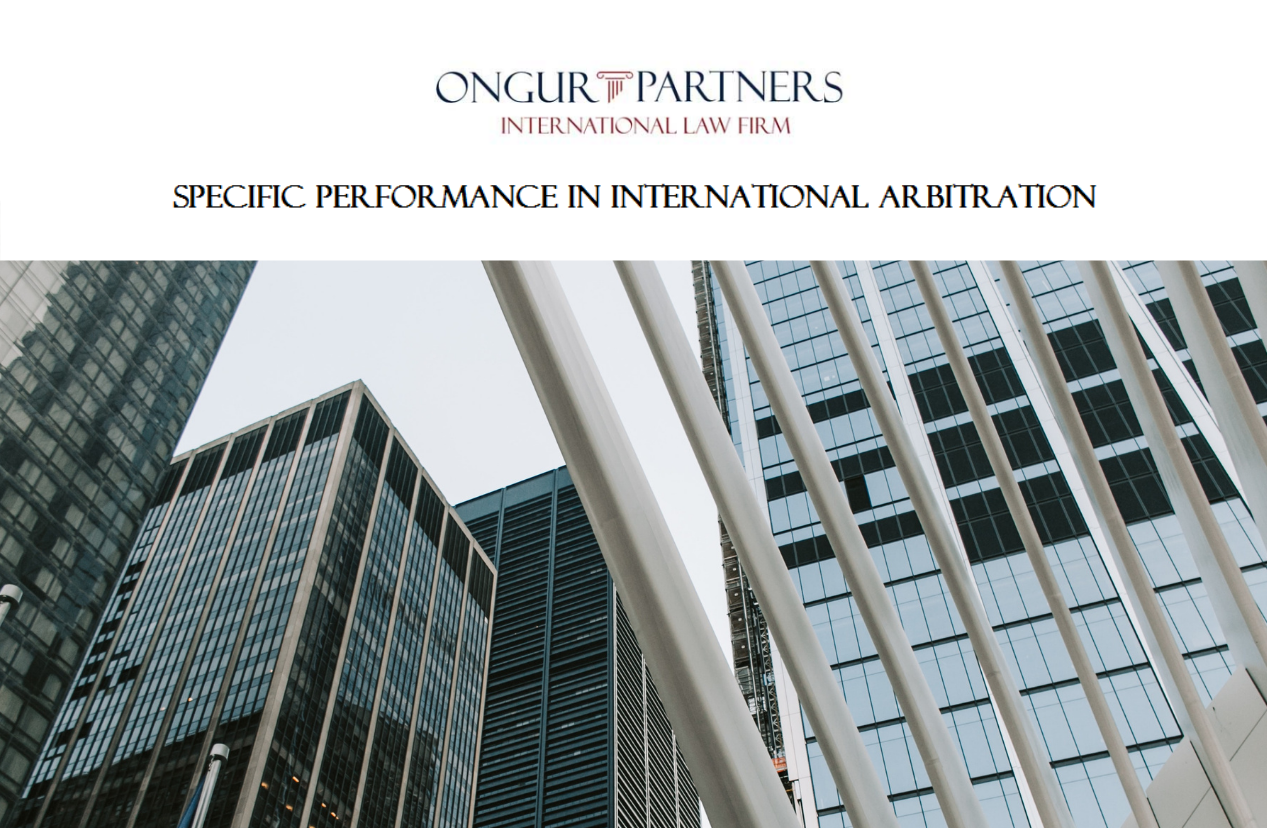Att. Gökberk TEKİN
Introduction

Arbitration is often perceived as a process by which the parties seek monetary damages.[1] However, the number and variety of the remedies available for the parties in international arbitration are very broad, indeed.[2] In this context, in addition to the monetary compensation, an arbitral award may (and often does) also include “punitive damages and other penalties, specific performance and restitution, injunctions, declaratory relief, rectification, filling gaps and adaptation of contracts”[3]
First of all, although the transactions in the international commercial arbitration and enforcement processes are being carried out confidentially and therefore it is not possible to provide a certain ratio; the studies carried out with the contribution of the arbitral institutions show that in “a great variety” of the cases, parties seek non-monetary reliefs.[4] Furthermore, according to the same studies, the arbitral tribunals are also not reluctant to grant such remedies as it will be illustrated below.[5]
Among these different options, in this paper, “the specific performance” remedy is evaluated and its common kinds are presented along with the factors that should be taken into account in ordering specific remedies.
Specific Performance
To begin with a brief definition of the concept, [6] with reference to the definition made by Samaa A.F. Haridi “specific performance” as a remedy can be defined as remedies ordering “(…) the (a) party (to) perform the obligations under the contract as required by the contract”[7]
In the practice of international arbitration; it is possible to observe that such remedies may be granted as the final determination or as interim measures.[8] In addition to that, it is also not rare to see that the specific performance remedy is granted along with the other types of remedies.
Common types of specific performance
As noted above, it is possible to mention a variety of non-monetary reliefs.[9] Being one of these remedies, “the specific performance” can also be held under some sub-divisions.
In this context, firstly, the specific performance may require a party to carry out certain acts and/or actions. Giving consent to a transfer, issuing power of attorney or handing over certain equipment[10] may be listed as some examples of such remedies.
For illustrating this type of specific performance remedy, it is possible to refer to some reported arbitral awards. For example, in one case reported by the ICC in which the “common law” applied, the Arbitral Tribunal ordered “the transfer of the Respondent’s 30% of the Participating Interest to the Claimants.”[11] Similarly in another ICC case, in which the “civil law” applied, the Respondent is ordered “to perform under the terms of the Agreement to enable the Claimant to sell, market, and distribute products covered by the Agreement” [12]
Secondly, the specific performance ordered by an arbitral tribunal can also be an “omission” which prohibits a party from carrying out certain actions. For example, cessation of acts breaching the contract,[13] not raising objections to certain procedures, not preventing certain acts would be examples of such “omissions”.
This type of remedy has also been widely applied by the different arbitral tribunals. To illustrate this type of remedy with the reported cases, it is possible to note that in a case reported by the ICC in which the “common law” applied to the merits of the Case, the Respondent was ordered to “cease any use of the trademark”[14]. Similarly, in a case reported by Vienna International Arbitral Centre, the Respondent was ordered “to refrain from transferring certain data to third parties without the consent”[15].
Factors and indications in ordering specific performance
In addition to the availability of specific performance as a remedy in international arbitration, the appropriate use of it also bears importance.[16] In this context, arbitral tribunals should evaluate a number of factors before ordering specific remedies.
The first of these factors is the agreement of the parties, which flows from the fact that arbitration is a consent-based process and the parties -save for some exceptions- are capable of agreeing on the powers of the arbitral tribunal. Accordingly, the parties may specify the remedies that may be ordered by the arbitral tribunal. Therefore, there is no doubt that the parties may exclude the “specific performance” remedy in the arbitration agreement.[17] In the absence of such agreement, the arbitral tribunal should apply the procedures available in applicable law.
The second factor that is relevant for the decision of specific performance is the applicable law. In this context, it should be taken into account that different legal systems have different regulations/applications for “specific performance”. It should be noted that every jurisdiction may bring different restrictions on the type of the specific performance remedy as well as the procedure for the adaptation of such remedies.
Herein the traditional differences between the common and civil law jurisdictions should also be emphasized.[18] More specifically, it is argued that in civil law jurisdictions specific performance is traditionally the primary remedy to be ordered upon the request of the Claimant, while in common law jurisdictions specific performance is often regarded as a secondary remedy to be applied in cases in which ordering damages would not be equitable.[19]
In addition to that specific regulations of “the law of the seat” and the “law of the jurisdiction parties will seek enforcement” would be relevant for an arbitral tribunal in ordering specific performance.
It is needles to note that the specific circumstances of the case would also be very important in deciding the specific performance.[20]
Conclusion
To conclude, it is possible to note that contrary to the common perception, in international arbitration alternative remedies to the monetary compensation is available. The existence of such remedies further contributes to the flexibility and efficiency of the arbitration process.
In this context, being one of these alternatives, “specific performance” should be regarded as an important tool in the “remedial armory of an arbitral tribunal”[21] which would enable the arbitral tribunal to reach a more equitable result.
However, it is vital for arbitral tribunals to evaluate the agreement of the parties, applicable law, and the specific circumstances of the case. Since ordering specific performance may not be suitable for the case and even more, applicable law may prohibit the arbitral tribunals to order such reliefs.
BIBLIOGRAPHY
Blackaby N and others, Redfern & Hunter On International Arbitration (6th edn, 2015)
Haridi AFS, ‘Remedies and Costs’ (Lecture in CIArb Diploma in International Arbitration, 2020)
Heider M, ‘International Arbitral Centre Of The Austrian Federal Economic Chamber (Vienna International Arbitral Centre))’, Performance as a Remedy: Non-Monetary Relief in International Arbitration: ASA Special Series No. 30 (1st edn, JurisNet 2011)
Hoellering M, ‘Remedies In Arbitration’ (1985) 20 The Forum (Section of Insurance, Negligence and Compensation Law, American Bar Association
Jones D, ‘Remedial Armoury Of An Arbitral Tribunal: The Extent To Which Tribunals Can Look Beyond The Parties Submissions’ Arbitration’ (2012) 78 Arbitration : the journal of the Chartered Institute of Arbitrators
Mazza F, ‘International Chamber Of Commerce (ICC)’, Performance as a Remedy: Non-Monetary Relief in International Arbitration: ASA Special Series No. 30 (1st edn, JurisNet 2011)
McKendrick E, and Maxwell I, ‘Specific Performance In International Arbitration’ (2013) 1 The Chinese Journal of Comparative Law
Moses M, The Principles And Practice Of International Commercial Arbitration (Cambridge University Press 2010)
Schneider M, ‘Non-Monetary Relief In International Arbitration: Principles And Arbitration Practice’, Performance as a Remedy: Non-Monetary Relief in International Arbitration: ASA Special Series No. 30 (1st edn, JurisNet 2011)
[1] Michael E. Schneider, ‘Non-Monetary Relief in International Arbitration: Principles and Arbitration Practice’, Performance as a Remedy: Non-Monetary Relief in International Arbitration: ASA Special Series No. 30 (1st edn, JurisNet 2011), p. 3.
[2] Michael F. Hoellering, ‘Remedies in Arbitration’ (1985) 20 The Forum (Section of Insurance, Negligence and Compensation Law, American Bar Association, p. 516.
[3] Nigel Blackaby and others, Redfern & Hunter on International Arbitration (6th edn, 2015), p. 515.
[4] Schneider (n 1) p. 16.
[5] ibid.
[6] However, it should also be noted herein that the definition of the “specific performance” term is subject to different views in different jurisdictions. This paper confines itself from presenting these discussions and provide an exhaustive definition on which there is a convergence.
[7] Samaa A.F. Haridi, ‘Remedies and Costs’ (Lecture in CIArb Diploma in International Arbitration, 2020)
[8] Schneider (n 1) p. 32.
Margaret L Moses, The Principles and Practice of International Commercial Arbitration (Cambridge University Press 2010), p. 187.
[9] Schneider (n 1) p. 7.
[10] ibid p. 14.
[11] Francesca Mazza, ‘International Chamber Of Commerce (ICC)’, Performance as a Remedy: Non-Monetary Relief in International Arbitration: ASA Special Series No. 30 (1st edn, JurisNet 2011), p. 144.
[12] ibid p. 147.
[13] Schneider (n 1) p. 14.
[14] Mazza (n 11) p. 146.
[15] Manfred Heider, ‘International Arbitral Centre of the Austrian Federal Economic Chamber (Vienna International Arbitral Centre))’, Performance as a Remedy: Non-Monetary Relief in International Arbitration: ASA Special Series No. 30 (1st edn, JurisNet 2011) p. 138.
[16] Blackaby and others (n 3) p. 519.
[17] ibid p. 515.
[18] This paper does not assert such a difference between çivil and common law systems. It is argued by some authors that both systems’ typical approach to specific performance is similar. See: E. McKendrick and I. Maxwell, ‘Specific Performance in International Arbitration’ (2013) 1 The Chinese Journal of Comparative Law
[19] E. McKendrick and I. Maxwell, ‘Specific Performance in International Arbitration’ (2013) 1 The Chinese Journal of Comparative Law, p. 200.
[20] Blackaby and others (n 3) p. 519.
[21] Doug Jones, ‘Remedial Armoury of an Arbitral Tribunal: The Extent to Which Tribunals Can Look Beyond The Parties Submissions’ Arbitration’ (2012) 78 Arbitration: the journal of the Chartered Institute of Arbitrators.



